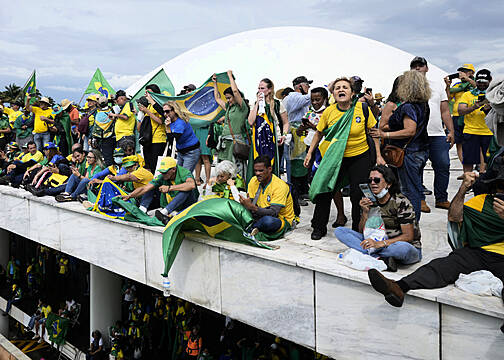Brazilian authorities have vowed to protect democracy after thousands of ex-president Jair Bolsonaro’s supporters stormed congress, the supreme court and presidential palace in the capital Brasilia.
The protesters were seeking military intervention to either restore the far-right Mr Bolsonaro to power or oust the newly inaugurated leftist Luiz Inacio Lula da Silva, unleashing chaos and destruction that bore striking similarities to the insurrection at the US capitol on January 6th, 2021.
Rioters donning the green and yellow of the national flag on Sunday broke windows, toppled furniture, hurled computers and printers to the ground at the nation’s highest seats of power in the capital.
They punctured a massive Emiliano Di Cavalcanti painting in five places, overturned the U-shaped table at which supreme court justices convene, ripped a door off one justice’s office and vandalised a statue outside the court.
The buildings’ interiors were left in states of ruin.
Authorities made a point to show that they were moving to prevent further attacks on Brazil’s democratic rule of law.
Estive agora à noite no Palácio do Planalto e no STF. Os golpistas que promoveram a destruição do patrimônio público em Brasília estão sendo identificados e serão punidos. Amanhã retomamos os trabalhos no Palácio do Planalto. Democracia sempre. Boa noite.
📸: @ricardostuckert pic.twitter.com/qkyVZHQQdz— Lula (@LulaOficial) January 9, 2023
In a news conference late on Sunday, Brazil’s minister of institutional relations said the buildings would be inspected for evidence including fingerprints while images would be scanned to hold people to account, before claiming the rioters apparently intended to spark similar actions nationwide.
Justice minister Flavio Dino said the acts amounted to terrorism and coup-mongering and that police have begun tracking those who paid for the buses that transported protesters to the capital.
“They will not succeed in destroying Brazilian democracy. We need to say that fully, with all firmness and conviction,” Mr Dino said.

“We will not accept the path of criminality to carry out political fights in Brazil. A criminal is treated like a criminal.”
So far, 300 people have been arrested, the federal district’s civil police said on Twitter.
But police were noticeably slow to react – even after the arrival of more than 100 busses – leading many to ponder whether authorities had either simply ignored numerous warnings, underestimated the protesters’ strength, or had been somehow complicit.
Public prosecutors in the capital said local security forces had at very least been negligent while a supreme court justice temporarily suspended the regional governor.
Another justice blamed authorities for not swiftly cracking down on Brazil’s budding neofascism, adding that they will be held criminally responsible.
I condemn the assault on democracy and on the peaceful transfer of power in Brazil. Brazil’s democratic institutions have our full support and the will of the Brazilian people must not be undermined. I look forward to continuing to work with @LulaOficial.
— President Biden (@POTUS) January 8, 2023
In the months that followed Mr Bolsonaro’s electoral defeat on October 30, Brazil was on edge, and wary of any avenue he might pursue to cling to power.
Mr Bolsonaro had been stoking belief among his hardcore supporters that the country’s electronic voting system was prone to fraud – though he never presented any evidence to support this claim.
His son Eduardo Bolsonaro also held several meetings with former US president Donald Trump, Mr Trump’s longtime ally Steve Bannon and his senior campaign adviser, Jason Miller.
Results from Brazil’s election – the closest in more than three decades – were quickly recognised by politicians across the spectrum, including some Bolsonaro allies, as well as dozens of governments around the world.
- Manifestações pacíficas, na forma da lei, fazem parte da democracia. Contudo, depredações e invasões de prédios públicos como ocorridos no dia de hoje, assim como os praticados pela esquerda em 2013 e 2017, fogem à regra.
— Jair M. Bolsonaro 2️⃣2️⃣ (@jairbolsonaro) January 9, 2023
Mr Bolsonaro surprised nearly everyone by promptly fading from view. He neither conceded defeat nor emphatically claimed fraud, though he and his party submitted a request to nullify millions of votes that was swiftly dismissed.
Brazilians have used electronic voting since 1996 that security experts consider less secure than hand-marked paper ballots because they leave no auditable paper trail. Brazil’s system is, however, closely scrutinised, and domestic authorities and international observers have never found evidence of it being exploited to commit fraud.
However, Mr Bolsonaro’s supporters refused to accept the results. They blocked roads and have remained camped outside military buildings, urging the armed forces to intervene.

Mr Dino, the justice minister, referred to the encampments as incubators of terrorism. Protests were overwhelmingly peaceful, but isolated threats – including a bomb found on a fuel truck headed to Brasilia’s airport – had prompted security concerns.
Two days before Mr Lula’s January 1 inauguration, Mr Bolsonaro flew to the US and took up temporary residence in Orlando. Many Brazilians expressed relief that, while he declined to participate in the transition of power, his absence allowed it to occur without incident.
Following Sunday’s havoc, Paulo Calmon, a political science professor at the University of Brasilia, said: “Bolsonarism mimics the same strategies as Trumpism. Our January 8th – an unprecedented manifestation in Brazilian politics – is clearly copied from January 6th in the capitol.
I condemn any attempt to undermine the peaceful transfer of power and the democratic will of the people of Brazil.
President @LulaOficial and his government has the United Kingdom’s full support, and I look forward to building on our countries’ close ties in the years ahead.— Rishi Sunak (@RishiSunak) January 9, 2023
“Today’s sad episodes represent yet another attempt to destabilize democracy and demonstrate that the authoritarian, populist radicalism of Brazil’s extreme right remains active under the command of former President Bolsonaro, the ‘Trump of Latin America’.”
US president Joe Biden tweeted that the riots were an “assault on democracy and on the peaceful transfer of power in Brazil,” and that he looked forward to continue working with Mr Lula.
In a news conference from Sao Paulo state, Lula read a freshly signed decree for the federal government to assume control of security in the federal district. He said that the so-called “fascist fanatics”, as well as those who financed their activities, must be punished, and also accused Bolsonaro of encouraging their uprising.
Mr Bolsonaro repudiated the president’s accusation.
Writing on Twitter, he said peaceful protest is part of democracy, but vandalism and invasion of public buildings are “exceptions to the rule”.
He made no specific mention of the protesters’ actions in Brasilia.







